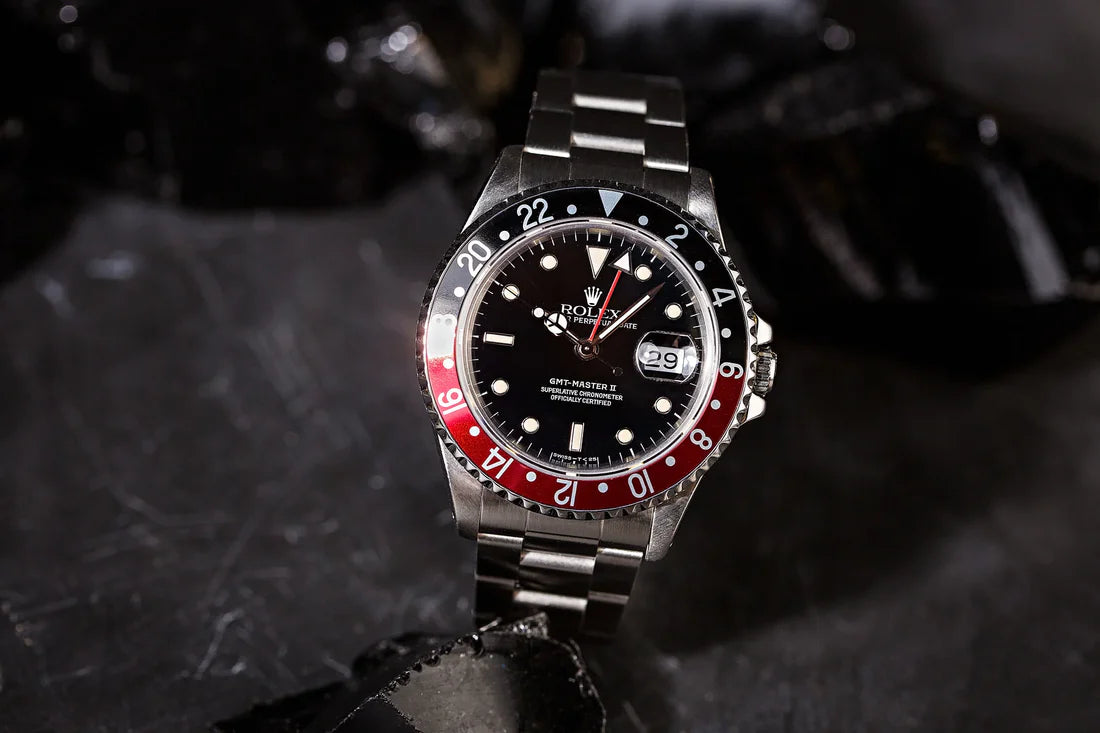
Rolex Coke GMT: The Legend Behind the Name
Share
A "Rolex Coke" refers to any Rolex GMT-Master II watch featuring a red-and-black bezel insert. The GMT-Master line was introduced in 1954 with a red-and-blue bezel, which enthusiasts have nicknamed the "Pepsi." The Coke variant emerged in 1983 with the GMT-Master II, distinguished by an independent 24-hour hand. This version remained in production until it was discontinued in 2007. Despite ongoing speculation among Rolex aficionados about its return, the Coke has not reappeared, except for the elusive "Icy Coke" models adorned with rubies and black sapphires on the bezel. Here is a comprehensive guide to the Rolex Coke models.
Rolex “Fat Lady” GMT-Master II ref. 16760 (1983-1989)
The GMT-Master II debuted in 1983, while the original GMT-Master, featuring a 24-hour hand synchronized with the regular hour hand, continued to be manufactured. Introducing the distinctive red-and-black bezel was likely intended to set the new GMT-Master II apart from its predecessor. As a result, the Coke bezel was never available for the GMT-Master I. Notably, the Coke bezel was exclusive to the original GMT-Master II, reference 16760, which remained in production until 1989.
Collectors often refer to the Rolex 16760 as the "Fat Lady" due to its relatively thick case, though at 12.6mm, it isn't particularly bulky by modern standards. It also features prominent crown guards. Another nickname, "Sophia Lauren," inspired by the actress's curvaceous figure, has fallen out of favor in recent years. Unlike its predecessors, the 16760 boasts a sapphire crystal and a modern movement operating at 8 beats per second (caliber 3085). Despite these updates, it retains vintage elements such as tritium lume and an open-6 date wheel. Due to its limited production run, the 16760 is highly collectible, yet prices remain reasonable, with good examples available for under $13,000.
Rolex Coke GMT ref. 16710 (1989-2007)
In 1989, the Rolex Coke GMT ref. 16710 succeeded the Fat Lady model, introducing only minor changes. The primary enhancement was its 3185 movement, which did not include any glued-together components. Although Rolex's industrial adhesive used in the 3085 model is typically effective for securing the hairspring to the regulator stud, the notion of using "glue" is generally unappealing to luxury watch enthusiasts. Beyond this, the 3185 offers performance similar to the 3085 but with a slimmer design, reducing the case height by approximately 0.6mm.
The 16710 features a more refined crown guard compared to the 16760, with a noticeably slimmer minute hand. Its major distinction is the availability of three bezel options: Pepsi, Coke, and all-black, with Pepsi inserts often fetching a premium. Rolex Service Centers typically allow owners to purchase different bezel inserts for the 16710.
In 1999, the 16710 transitioned to non-radioactive Super-LumiNova lume, and a year later, it received solid end links. Around 2002, lugholes were phased out, giving rise to the reference 16710T, though collectors commonly refer to both models as "16710."
By 2007, the 16710T began incorporating the 3186 movement, which offered enhanced magnetic resistance and reduced 24-hour hand "wobble" compared to the 3185. Despite expectations, the market did not significantly value this upgrade.
Rolex “Coke With Ice” GMT
In 2024, Rolex introduced two exclusive GMT-Master II models, dubbed "Coke with Ice," as part of their off-catalog releases. These opulent timepieces boast lavish bezels adorned with rubies and black sapphires, complemented by diamonds encrusting the lugs, crown guard, and bracelet. This follows the release of the initial Icy Coke Rolex GMT, which debuted a year prior with a bracelet free of diamonds. Anticipate resale prices to exceed $150,000 if one ever becomes available.
Contact our sales representatives about this or any other model.
